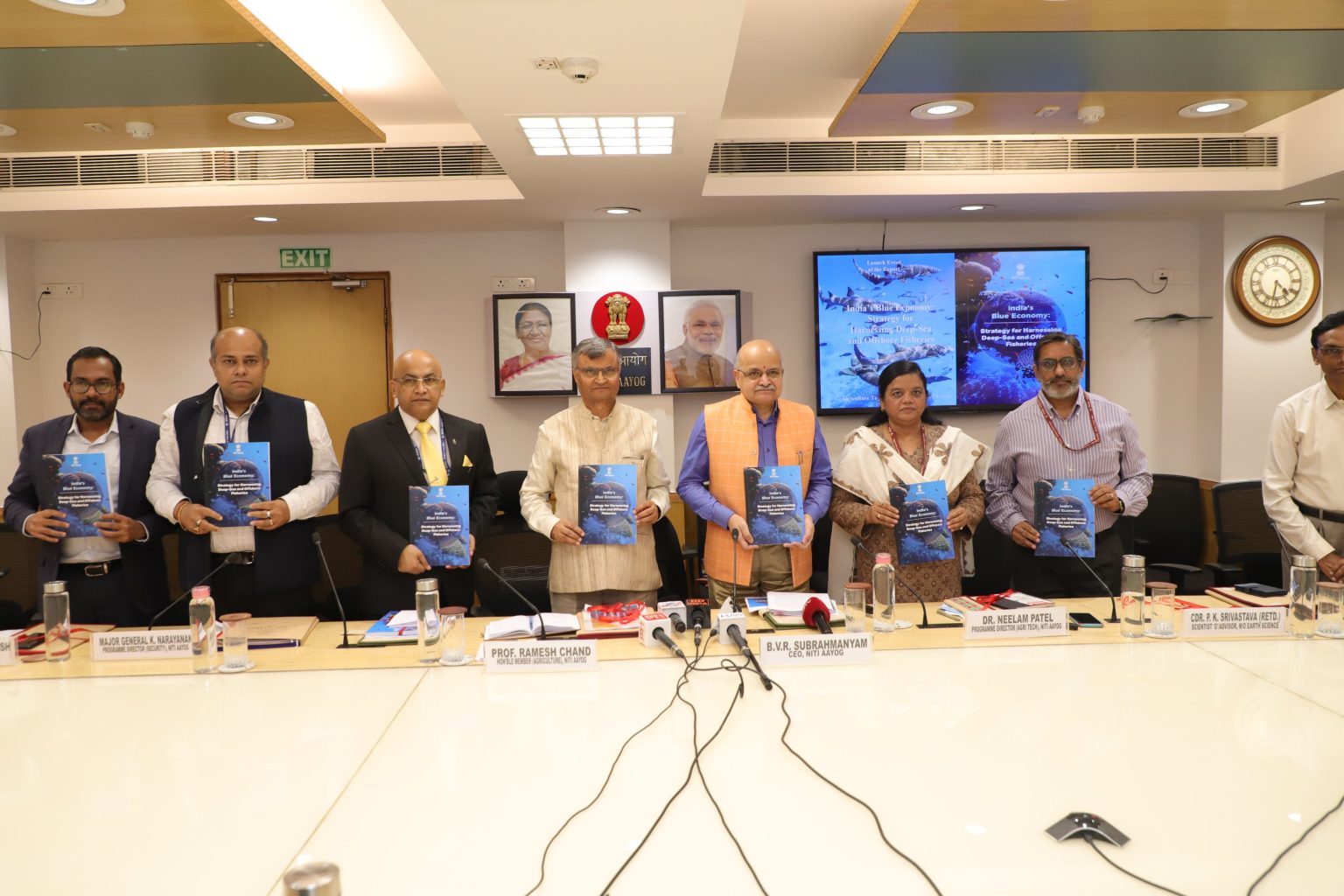NITI Aayog CEO Launches Report on India’s Blue Economy and Deep Sea Fisheries Strategy

NITI Aayog Launches Report on India’s Blue Economy and Deep Sea Fisheries Strategy
Introduction
The CEO of NITI Aayog, B. V. R. Subrahmanyam, launched a landmark report titled “India’s Blue Economy: Strategy for Harnessing Deep Sea and Offshore Fisheries” in New Delhi today. The report outlines a comprehensive framework for the sustainable exploration and management of India’s deep-sea resources, underscoring the government’s commitment to advancing the nation’s Blue Economy vision.India, with approximately 12 nautical miles of territorial waters and an Exclusive Economic Zone (EEZ) of 200 nautical miles, possesses vast and largely untapped marine potential. The report seeks to transform India from a nearshore fishing nation to a global leader in sustainable deep-sea fisheries and ocean governance.
I. Key Highlights of the Report
- Three-Phase Strategic Roadmap
- Phase I – Foundation Building: Focus on institutional strengthening, marine data collection, and capacity enhancement for deep-sea fishing operations.
- Phase II – Scaling Up Operations: Emphasis on modernisation of fishing fleets, innovation in aquaculture technologies, and development of marine infrastructure such as ports and cold storage chains.
- Phase III – Global Leadership: Aims to position India as a hub for sustainable deep-sea fisheries, marine biotechnology, and ocean-based innovation.
- Focus Areas of the Report:
- Governance: Strengthening policy coordination among central and state agencies, and ensuring science-based fisheries management.
- Innovation and Technology: Integration of AI, satellite mapping, and IoT-based monitoring systems for sustainable marine resource utilisation.
- Economic and Social Inclusion: Promoting livelihood diversification and value addition for coastal and island communities.
- Environmental Sustainability: Ensuring long-term conservation of marine biodiversity through eco-sensitive fishing practices and regulation of offshore exploitation.
- Institutional Framework:
- Proposal to establish a National Centre for Deep Sea Fisheries and Blue Economy Research to coordinate policy, research, and industry partnerships.
- Recommendation for creating marine clusters and coastal entrepreneurship hubs for integrating small fishers into formal supply chains.
- Stakeholder Engagement:
- The report stresses the need for collaboration among government bodies, research institutions, private sector players, and local fishing communities.
- Emphasis on gender inclusion and skill development, enabling women’s participation in value-chain processes.
II. Context: India’s Blue Economy Vision
India’s Blue Economy refers to the sustainable use of ocean resources for economic growth, improved livelihoods, and ecosystem health.
It forms a key pillar of the Government’s Vision 2047 and complements flagship initiatives such as:
- Pradhan Mantri Matsya Sampada Yojana (PMMSY) – enhancing fish production and infrastructure.
- Deep Ocean Mission – promoting exploration of polymetallic nodules and marine biodiversity.
- Sagarmala and Maritime India Vision 2030 – improving port-led economic development.
The NITI Aayog report aligns with these national missions, emphasizing a science-driven, inclusive, and resilient ocean economy.
III. Significance of the Report
- Economic Potential:
- India’s marine sector currently contributes about 4% to the GDP from fisheries and allied activities.
- The report estimates that a well-managed Blue Economy could contribute up to USD 100 billion annually by 2047.
- Employment and Livelihoods:
- The fisheries sector supports over 16 million fishers and fish farmers, particularly in coastal states such as Kerala, Tamil Nadu, and Gujarat.
- Deep-sea resource development offers new opportunities in processing, logistics, marine biotechnology, and eco-tourism.
- Food Security and Exports:
- Expanding deep-sea fisheries can reduce pressure on overexploited coastal zones while enhancing India’s role as a major exporter of high-value seafood.
- Environmental Sustainability:
- Promotes the adoption of ecosystem-based management (EBM) and climate-resilient fishing practices, ensuring long-term ecological balance.
IV. Challenges and Way Forward
Challenges:
- Limited data on deep-sea biodiversity and resource availability.
- Inadequate infrastructure for deep-sea fishing operations.
- Fragmented regulatory framework across multiple ministries.
- Threats from climate change and ocean acidification.
Way Forward:
- Adoption of integrated marine spatial planning for sustainable resource allocation.
- Investment in R&D and capacity building through collaboration with global ocean research institutions.
- Incentivising private sector participation through blue bonds and sustainable finance mechanisms.
- Strengthening international cooperation in areas like marine governance and technology transfer.
V. Analytical Perspective
The report represents a transformative shift in India’s maritime policy, moving beyond traditional fisheries towards a comprehensive ocean economy framework. It integrates sustainability, innovation, and inclusion as core principles of growth.By focusing on deep-sea resource governance, India positions itself among emerging maritime nations seeking to balance economic expansion with environmental responsibility.Moreover, the emphasis on coastal community empowerment and technology-driven fisheries management aligns with India’s broader goals of Atmanirbhar Bharat and Maritime India Vision 2030.
Conclusion
The NITI Aayog’s report on the Blue Economy and deep-sea fisheries strategy provides a forward-looking roadmap for harnessing ocean wealth responsibly. It envisions India as a global leader in sustainable marine resource management, contributing not only to national prosperity but also to global ocean stewardship.By integrating science, policy, and community engagement, India’s approach to the Blue Economy embodies the spirit of inclusive, sustainable, and resilient maritime development — vital for achieving the nation’s long-term economic and ecological aspirations.
Updated - October 13, 2025 10:00 PM | News On Air